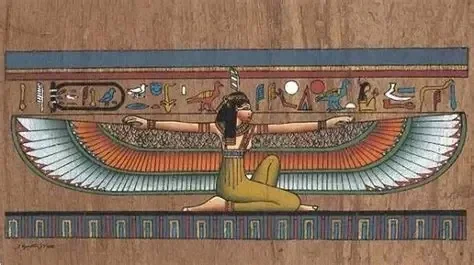
The Ankh of Recognition: A Lost Current of Divine Remembrance
In the sacred currents of ancient Egypt, there was a teaching hidden beneath the more familiar myths, a teaching for those whose souls had already walked the line of Ma’at, for those whose hearts were already light. This is the doctrine of the Ankh of Recognition: not a symbol of mere life, but the mark of divine acceptance.
The Two Paths Through the Hall of Truth
In the common telling, the Hall of Two Truths is a tribunal: your heart is weighed against the feather of Ma’at, and fate is decided. This is the version you often see in funerary texts, the solemn ceremony, Thoth recording, the 42 assessors.
Yet in the deeper mystery tradition, this is not the only path.
For those who have aligned with Ma’at in life and in spirit, the gods themselves may step forward, not to pass judgement, but to recognise. Their vote comes not in condemnation, but in breath and light. They offer the ankh.
To have the ankh held out by a deity is to be seen, to be known. Their “yes” is not a test, it is an acceptance.

Ancient Roots of the Doctrine
Fragments of this teaching can be found scattered through funerary literature:
- In Spell 125 of the Book of the Dead, the gods declare the soul maa-kheru (“true of voice”) and say, “He is known to us.”
- In Spell 30B, the deceased even prays, “Let not the weighing be done for me,” implying a different outcome is possible.
- In the Coffin Texts, there are references to gods “recognising the light” of the righteous and “granting the ankh to the justified.”
- In the later Book of Breathings, there is a more explicit line: “He shall not be weighed, for his heart is true.”
What this reveals is a hidden current: justification by recognition, not by trial.

Ancient Roots of the Doctrine
Fragments of this teaching can be found scattered through funerary literature:
- In Spell 125 of the Book of the Dead, the gods declare the soul maa-kheru (“true of voice”) and say, “He is known to us.”
- In Spell 30B, the deceased even prays, “Let not the weighing be done for me,” implying a different outcome is possible.
- In the Coffin Texts, there are references to gods “recognising the light” of the righteous and “granting the ankh to the justified.”
- In the later Book of Breathings, there is a more explicit line: “He shall not be weighed, for his heart is true.”
What this reveals is a hidden current: justification by recognition, not by trial.

